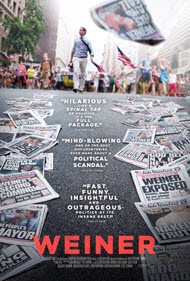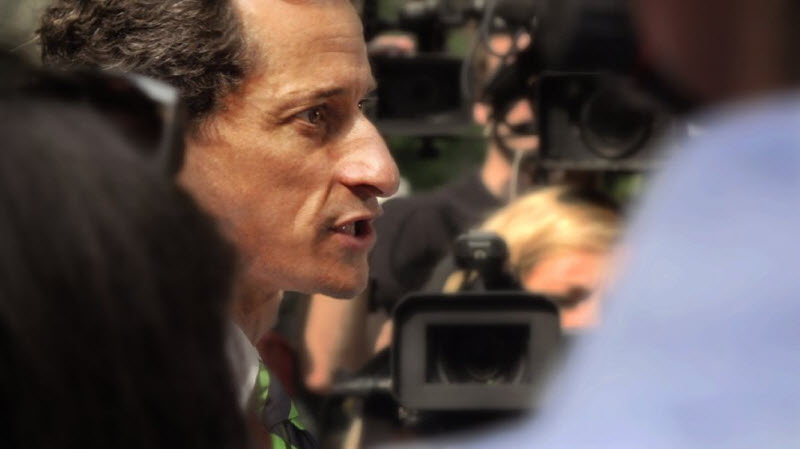Weiner
 for language and some sexual material.
for language and some sexual material.
Reviewed by: Jim O'Neill
CONTRIBUTOR
| Moral Rating: | Offensive |
| Moviemaking Quality: |
|
| Primary Audience: | Adults |
| Genre: | Documentary |
| Length: | 1 hr. 36 min. |
| Year of Release: | 2016 |
| USA Release: |
January 24, 2016 (festival) May 20, 2016 (limited) Internet: May 26, 2016 DVD: August 23, 2016 |



What part should morality play in politics? Answer
Does character matter in political leaders? Answer
Voting—Do Christians have an obligation to vote? Answer
lust and fornication
PURITY—Should I save sex for marriage? Answer
How can I deal with temptations? Answer
What are the consequences of sexual immorality? Answer
| Featuring |
Anthony Weiner … Himself Huma Abedin … Herself Amit Bagga … Himself Adam S. Barta … Himself Stephen Colbert … Himself (archive footage) Bill de Blasio … Himself (archive footage) Sydney Leathers … Herself Lawrence O'Donnell … Himself (archive footage) Howard Stern … Himself (archive footage) Jon Stewart … Himself (archive footage) Donald Trump … Himself (archive footage) Jordan Zain Weiner … Himself |
| Director |
Josh Kriegman Elyse Steinberg |
| Producer |
Motto Pictures |
| Distributor |
IFC Films Sundance Selects Showtime Networks |
Several years ago I was walking past New York City’s Grand Central Station when a limousine pulled up to the entrance. Four men in suits got out. All four jumped and ran, one for the limo’s passenger door, one for the station gate, and the other two, the biggest of the group, for the crowds moving en masse in front of Grand Central. The big guys held the throngs back. They made us stand still, something New Yorkers do not like to do. But our annoyance was blunted by a momentary fascination with the scene unfolding before us.
Who would emerge from the car?
When Anthony Weiner, the New York Congressman representing the 9th of New York State’s 29 districts, got out of the car, there were no cheers, no waves, and no camera clicks. Instead, there was a collective shrug and a push against the big guys who were blocking everyone’s way.
Weiner may not have gotten the star treatment from the crowd, but during that moment, I was amazed at how the Congressman did not touch a door handle, cede his way to someone else, or need to say “excuse me.” He never once looked up. His eyes stayed fixed on his phone, his hands never leaving the keypad. His path cleared, he was free to sail effortlessly past everyone and everything.
A sinner, I let envy get the better of me that day. The scene I just encountered reminded me of a passage from Tom Wolfe’s The Bonfire of the Vanities, in which a fictional city mayor spoke about what made a life in politics “worth it,” how so much “bad” made the “good” worth the taking. Was it money or fame or the ability to make a difference? Sorta, but notta so much. What really drove that mayor was “the way they jump when I speak or just when I enter a room.”
During my encounter with Congressman Weiner and his bodyguards, I got what that mayor was talking about. Even a lone representative of one of the United States’ 435 districts has enough clout to “make them jump.”
Until he doesn’t.
While I was watching the gripping and insightful documentary film, “Weiner” by Elyse Steinberg and Josh Kreigman, I felt as though I was watching a bad car accident, one that was shocking and repellent, but one that I could not look away from. The film traces Anthony Weiner’s political rise (he won at least 60% of the vote in his district five subsequent times), his considerable influence as a liberal member of the House of Representatives, his marriage to top Hillary Clinton aide, Huma Abedin, and his volcanic slide into a political and personal abyss when he got caught up in a sex scandal that rocked the city, and the nation, in 2011. He was sending suggestive text messages and lewd pictures of himself to women around the country.
Weiner confronted his scandal in the way many politicians do. He pointed the finger at others: political opponents, phantom hackers, and a merciless media. He obfuscated. He spun. I could use the word “lie,” but I sense the word, which implies an acknowledgment of wrongdoing, is no longer a part of the political lexicon. Weiner’s “meant to confuse” jargon might have worked for the Congressman the way it did for a former US President who was a mentor of Weiner’s (that President officiated at Weiner’s and Abedin’s wedding), if not for those “selfies” themselves, which were replicated, blown up and mocked on Web sites, late night TV shows and especially on the daily front pages of the New York Post (“Weiner Exposed,” “Weiner’s Rise and Fall”). The outrage over Weiner’s behavior forced him to capitulate and ultimately to resign from Congress.
After the scandal abated a bit, and I do mean “a bit,” Weiner decided to attempt a comeback and run for mayor of New York City. His grit and determination, along with the support of a committed and talented campaign staff, and especially the considerable political skill of his wife (one can see why Hillary Clinton—for the most part absent from the film, although she does cast a pall over the entire affair—relies so strongly on her) bring him close to a resurgence, and even to a win. He actually leads in the Democratic primary polls early in the race.
Just when he seems to have recouped it all, and to be, if not on top, at least in the game, a new set of pictures, even more explicit than the earlier photos, emerge. He is once again sending anatomical “selfies,” this time to a 23 year old actress who is looking to start a career in pornographic films. Weiner uses the screen name “Carlos Danger” in his communications with the young lady.
Meet the new candidate. Same as the old candidate. As his wife coolly but aptly summarizes the situation: “Not good.”
Does Weiner quit the race and retire from politics once and for all? If you think so, or hope so, you do not know this scrappy pol. He forges on. And on. And so does the media who revel in the story. Weiner does not shy away from his press critics. He faces the pundits head on, even laughing at questions that try to elicit an understanding of his proclivities. When Lawrence O’Donnell of MSNBC asks “What is the matter with you?” Weiner fires back: “What is the matter with YOU?”
He desperately tries to shape campaign events to fit his own agenda, but the press corps will have none of it. When Weiner holds a news conference to talk about opportunity zones or housing in the Bronx, he asks if the press has any “on topic” questions. He is met with stony silence. When he follows up by asking them if they have any off-topic questions, it’s off to the races. They fire away mercilessly.
Weiner and his staff discuss messaging and optics, as if the selfies do not have an optic and a message all their own. The campaign fights on, the way the black knight in “Monty Python and the Holy Grail” strikes, cajoles and bellows, no matter how many of his arms and legs get cut off: “it’s a mere flesh wound.” Even Weiner’s opponents in the mayoral race start to leave him alone. Who wants to win against an opponent who wallows in his own mud?
Weiner sums up his travails by saying “I’ve done a dumb thing, but I’ve done many good things.” One has to wonder what Weiner means by “dumb.” Is what he did a mistake on the level of a typo? Is it unwise merely because “Carlos Danger” has been caught and unmasked? Or is “dumb” the same thing as “wrong,” something that an amend needs to made for, and something that requires some degree of contrition? Weiner seems to have remorse not for doing something immoral, but for being caught doing something that others consider immoral. He encourages voters to look forward, not backwards, as if our own histories hold no clues as to how we behave today and how we might behave in the future.
The filmmakers have put together a captivating study of how politics works from the inside, how a campaign struggles to stay afloat, and how difficult the whole process is. One better love that process in order to stay in the game. Weiner and his team obviously have passion. But passions, if left unchecked, can wound us and take us down, and as this often brilliant documentary reveals, it is the self-inflicted wounds that can do the most damage.
Violence: Minor / Profanity: Heavy / Sex/Nudity: Moderate
What part should morality play in politics? Answer
Does character matter in political leaders? Answer
Note: According to Breitbart.com, “The most important thing you need to know about the documentary Weiner doesn’t come until the very end, in the movie’s credits: it was financed in part with a grant from the George Soros-funded Open Society Institute. …Where it fails utterly is telling the truth about Anthony Weiner and Huma Abedin. The audience won’t know that, however. …The film gives Weiner a platform to lie. …The filmmakers successfully make Huma into a victim. …Although Weiner is the main character, it’s Huma who is the film’s real identifiable protagonist. She is the one that audiences will identify with. It’s her future—and by extension Hillary’s—that the film seems really concerned with.” (January 25, 2016)
See list of Relevant Issues—questions-and-answers.


PLEASE share your observations and insights to be posted here.

